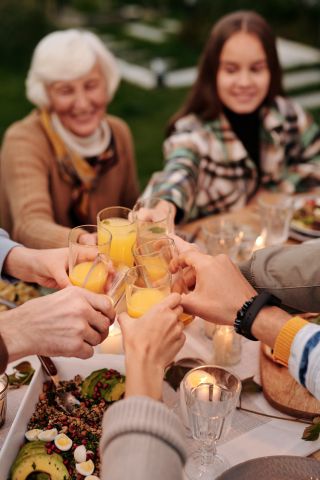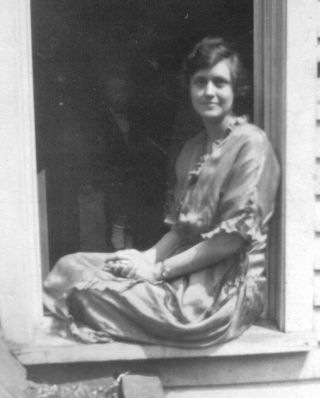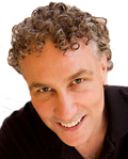Adoption
Longing to Belong Led Me to Genealogy
A Personal Perspective: I was happy to accept my adopted uncle into the family.
Posted November 13, 2023 Reviewed by Abigail Fagan

I always wanted to belong to a big family. I took up genealogy as a hobby, which led me to connect with cousins all over the country.
Half of My Family Tree Disappeared in an Instant
Losing my parents when I was still a young adult only exacerbated my longing for belonging. But then something weird happened. In May of 2022, I learned I am unrelated to my dad. Years of research became irrelevant instantly, as one-half of my family tree evaporated.
My discovery evoked many feelings: first bewilderment and depression, then an obsession with learning the truth. There was also excitement about meeting and connecting with new family members. Still, when that didn't happen right away, I realized my interest in ancestry was a desire to belong.
Recently, I reflected on the meaning of a portentous event from two decades ago that would foreshadow that desire. It began after my mother died and I sorted a hatbox of old family photographs*. I contacted Mother's first cousin, Maggi, to ask if she could help me build a family tree. My first question to her was how she was related to my mother. She replied, "Our fathers were brothers."
I Learned for the First Time My Grandfather Had Siblings
I was stunned and sputtered, "What? My grandfather had a brother? Mother never mentioned having an uncle; I just assumed Granddaddy was an only child like she was."
Maggi replied, "He had two brothers and two sisters; my father was the oldest. Oh, and a few years ago, a man contacted the family and claimed he was a brother who'd been put up for adoption."
"I can't believe my grandfather had all those siblings, and this is the first I'm hearing about it," I said.
"It could be that your mother, or perhaps her father, was ashamed of our side of the family."
"Why?"
My Great-Grandfather Was the Black Sheep of the Family
Maggi explained. "Well, my grandfather was the black sheep of the family. He was a barber in a college town and a bootlegger selling illegal whiskey during Prohibition. My father told me that grandfather was either not paying enough kickback money to the mob or enough bribe money to the local crooked politicians, and a hit was put out by one or the other to kill him. He fled the country to save his life, but he abandoned his pregnant wife and five children. My grandmother then sent her children to live with her parents on the farm while she went back to school and became a nurse. When the baby was born, she put it up for adoption. After completing her training, she found a job in a bigger city, moved there with her children, and then raised them on her own."
"So, what about the adopted son?" I asked.
"He contacted his two sisters and one brother who were still living, but they didn't know what to do about him, so I don't think they met him. I don't think they believed him. Aunt Nell is the only one still alive, and I know she had some written correspondence with him. I have his contact information if you want to reach out."
"Yes," I said. "I'd like that."
I Met My Grandfather's Youngest Brother
The desire to belong is a universal human need that is found in all cultures. Our need to be a part of a group is a powerful motivator that dates back to our cave-dwelling days. Our acceptance in the clan — our inclusion by the group — made the very difference between life and death. Our survival depended on this close-knit community. And, when it comes to our needs for bonding and support, nothing has changed in all the millennia since then. Abraham Maslow, in his hierarchy of human needs, placed belonging on the third tier. He said that an individual must satisfy his or her physiological and safety needs, before being able to love and belong.
Family is always the first group to which we belong. We don’t get to choose which family we have, but it will have an impact on which groups we will be able to join in the future. Family affects your social status and your long-term prospects for acceptance and even prosperity.
Learning that you are adopted (or in my case donor conceived) can disrupt your sense of familial belonging. How well you resolve those feelings can be affected by the support you receive from your genetic or adoptive family.
I wrote to Uncle Leon, who was thrilled to hear from me. He told me he'd tried to find out who his birth parents were, but he was blocked from finding them because my great-grandmother opted for a closed adoption with sealed records.
A few years later, when World War II started, he went to enlist, but a childhood skating accident, which cost him an eye, caused him to be rejected. He told the recruiter with the army that he wanted to serve his country. The man suggested he join the U.S. Merchant Marine, whose ships and sailors served the war effort as a supply line, and how they needed men because the military took most.
Uncle Leon eagerly went to join the Merchant Marine, but he was told he needed a passport. When he went to get a passport, he was told that he was not eligible for one with his adoption papers during wartime and that he needed his original birth certificate.
Unfortunately, that was forbidden to him. However, so many men were required for the war effort that he received an exception from the federal government to unseal his records, and he got a certified copy of his original birth certificate. He now knew his mother's and father's name along with an address.
My Uncle Went to Meet His Mother
In late 1942, before he shipped out, Leon traveled to his birth mother's home and rang the doorbell. A young adult answered the door (probably one of his siblings). He asked for his mother by name but was told she died six months earlier.
He was so heartbroken by the news that he couldn't speak. He turned around and walked away without mentioning who he was. Leon was 22; he would not make contact with his birth family again until he was in his 70s.
Leon was in his 80s when we met. He told me he married late in life, did not have any children, and was raised an only child with a stern father. He was overjoyed to hear from me and said I was the first person from his birth family to acknowledge him. His siblings had denied that he was related to them, but his birth certificate was proof enough for me. He was so grateful and happy to be accepted as a member of our family finally.
Uncle Leon Wished He Knew What His Mother Looked Like
He and I regularly wrote letters to each other and talked often on the phone for the remaining years of his life. I traveled to see him on three occasions, one time with my wife and children. In one of his letters, he expressed great sorrow that he didn't know what his mother looked like. That got me to return to the hatbox of old photographs.
As a teenager, my grandfather was a shutterbug and took lots of those pictures. I scrutinized them and found five of the same woman. I then showed the photos to Cousin Maggi and asked if the woman in them was her grandmother.
She said, "Yes."
Next, I made an enlarged copy of each and mailed it to Uncle Leon.

He phoned me as soon as he got them. He sobbed tears of joy as he thanked me over and over again. I told him I was happy, too, because I got to find out what my great-grandmother looked like and could also identify another unknown person in my photo collection. However, I was mainly happy to help Uncle Leon satisfy his lifelong dream.
Two decades later, I understand even more how important belonging was to him because I, too, would love to see photos of my birth father and to be accepted by his family.
*To learn how I became involved in genealogy, read my previous post.




